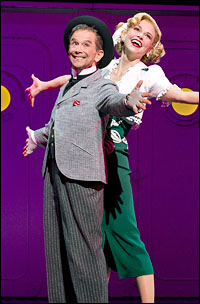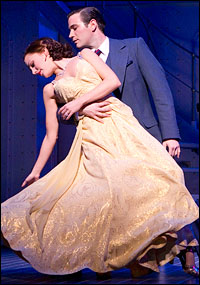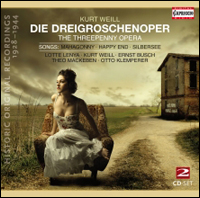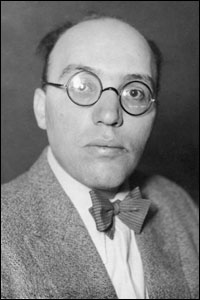
*
Anything Goes [Ghostlight 8-4452]
Our column of April 4 surveyed the many cast recordings of Cole Porter's Anything Goes in advance of the current Roundabout Theatre Company revival on Broadway, not quite anticipating that this new edition — starring Sutton Foster, and under the circumstances I suppose I should write starring SUTTON FOSTER — would belong near the top of the list. But thanks to SUTTON FOSTER, director-choreographer Kathleen Marshall and the music department (led by Rob Fisher), this new entry succeeds admirably.
The prize of the evening is SUTTON FOSTER, and of the CD too; there are seven especially good tracks, six of which feature Ms. F. I suppose that some Patti LuPone enthusiasts will emphatically turn thumbs down on this CD — perhaps without even listening to it? — in favor of the 1987 Lincoln Center cast recording. LuPone was a force of nature in that earlier revival, yes; but the nature in question, to me, was that of Patti LuPone. In the same way, I suppose, that Ethel Merman — who originated the role of Reno Sweeney — was pure Ethel Merman.
Sutton Foster — or, rather, SUTTON FOSTER — does not seem to be playing Merman or LuPone or even Foster; she is playing Reno Sweeney, a character with songs by Cole Porter and lines written and rewritten and rewritten by no less than six librettists. And it is that creation — Sweeney-as-played-by-Foster — which makes the performance so good on the stage of the Stephen Sondheim. (Sweeney on the stage of the Stephen Sondheim???)
| |
 |
|
| Joel Grey and Sutton Foster in Anything Goes. | ||
| photo by Joan Marcus |
With Foster acting the role, Reno Sweeney turns out to be a delightful creation rather than a costume to be fitted to the persona of the star, for which I give Ms. Foster and Ms. Marshall an extra round of applause. That's the magic which lifts this revival, the Roundabout's most satisfying outing since — what, "Twelve Angry Men" in 2004? The sense of pure joy emanating from Foster permeates the entire enterprise. This revival is not so sleek and handsome and stylish as the Jerry Zaks edition that deservedly lit the Beaumont for two years, but I find it to be considerably more fun.
That said, this Anything Goes is somewhat diminished by the problem that hampers all revivals of Anything Goes. On the CD at least, where it is more noticeable than when you are sitting delightedly in the theatre. Namely, the reconstituted score; it seems that nobody reviving the show, going back to at least 1955 and perhaps before, ever thought that Porter's original score was strong enough. There is no harm in the addition of "Friendship," one of the highlights in the present revival thanks to the clowning provided by Ms. Foster and Mr. Joel Grey. While that song wasn't written till 1939, it was tailor-made for Merman and handily fits into Anything Goes.
| |
 |
|
| Laura Osnes and Colin Donnell in Anything Goes. | ||
| photo by Joan Marcus |
These songs get by in the theatre, at least in Kathleen Marshall's version; but on the CD they are far less interesting than Sutton's six songs. One non-Sutton song is similarly swell, "Buddie Beware" — a song that was introduced by Merman but cut from the show after a few weeks. Since the 1962 Off-Broadway revival, it has been sung by the soubrette Erma, and is exceedingly jolly in the hands of Jessica Stone.
Colin Donnell is okay as Billy, running head on into the central enigma of the adaptation: how can you be both a convincing romantic lead and a scampish star comic who can hold his own against Reno? The second act surprise of the show is provided by Adam Godley, as Lord Evelyn Oakleigh; his rendition with Foster of "The Gypsy in Me" is one of the grandest eccentric musical performances we've seen since Michael Jeter in Grand Hotel.
But it is Sutton's show; or, rather, SUTTON's show, and her CD. Anything Goes has never been considered a highpoint of musical dramaturgy — that would probably ruin most of the fun, wouldn't it? — but I believe every word of every lyric Foster sings on the CD, as I did every moment she spent on stage at the Sondheim.
| |
 |
|
| Cover art for Kurt Weill: Die Dreigroschenoper/O Moon of Alabama |
O, that moon of Alabama is here once more. Capriccio, the Vienna-based label that has given us a whole shelf full of Weill recordings both vintage and new, now sends forth a two-CD set featuring 46 early recordings. These are mostly from pre-War Germany, full of scratches and pops that have been gently doctored into improved condition. The value is that we get to hear these songs the way they sounded when they were written, as opposed to later interpretations. What's more, we get many original cast performances, with what seems to be the pit band. Some of these tracks have appeared on prior compilations, including those from Capriccio. Many are appearing on CD for the first time, at least according to the liner notes.
The first disc is filled with two dozen pieces of Die Dreigroschenoper, which is to say The Threepenny Opera. Here is Harald Paulsen, who created the role of Mackie Messer; the Polly of Carola Neher; and, of course, Lotte Lenya as Jenny. It is exhilarating to hear these songs in their original settings, which are generally briskly paced and frenetic played. These are the same Weill orchestrations we are accustomed to from most subsequent productions, but they sound especially vibrant here despite the sonic antiquity.
Weill's later, Broadway orchestrations are more staid; these, especially the Threepenny charts, are hot. Eleven selections with original cast members are followed by six tracks of Threepenny for wind orchestra, two from original conductor Theo Mackeben and the others from the orchestra of the Staatsoper Berlin, conducted by Otto Klemperer. These instrumentals are just as lively as the others. Then come three 1931 singles from Paris and one from Copenhagen, plus two that are described as Dance Arrangements. Everything sizzles. Granted, after a while this might be slightly too much Threepenny; we hear the same songs again and again, mostly in German. But it is all authentic Threepenny, circa 1928-31.
The second disc calls itself "O Moon of Alabama: Songs by Kurt Weill in historic original recordings of 1928-1944," and that's a pretty apt description. This presents selections from Mahagonny, Happy End, Der Silbersee and others. These pieces might be foreign to most American listeners, which is a shame; if you love the music of Threepenny, as you know it from various English adaptations, you will love "Alabama Song," "Surabaya Johnny," "Bilbao Song" and more. Once again Lenya is in evidence, along with conductor Mackeben.
| |
 |
|
| Kurt Weill |
This Weillfest ends with two propaganda songs (in German) recorded by Weill and Lenya for short-wave transmission to Germany by the U.S. Office of War Information in 1943-44.
(Steven Suskin is author of the recently released updated and expanded Fourth Edition of "Show Tunes" as well as "The Sound of Broadway Music: A Book of Orchestrators and Orchestrations," "Second Act Trouble" and the "Opening Night on Broadway" books. He also pens Playbill.com's Book Shelf and DVD Shelf columns. He can be reached at Ssuskin@aol.com.)
Visit PlaybillStore.com to view theatre-related recordings for sale.










